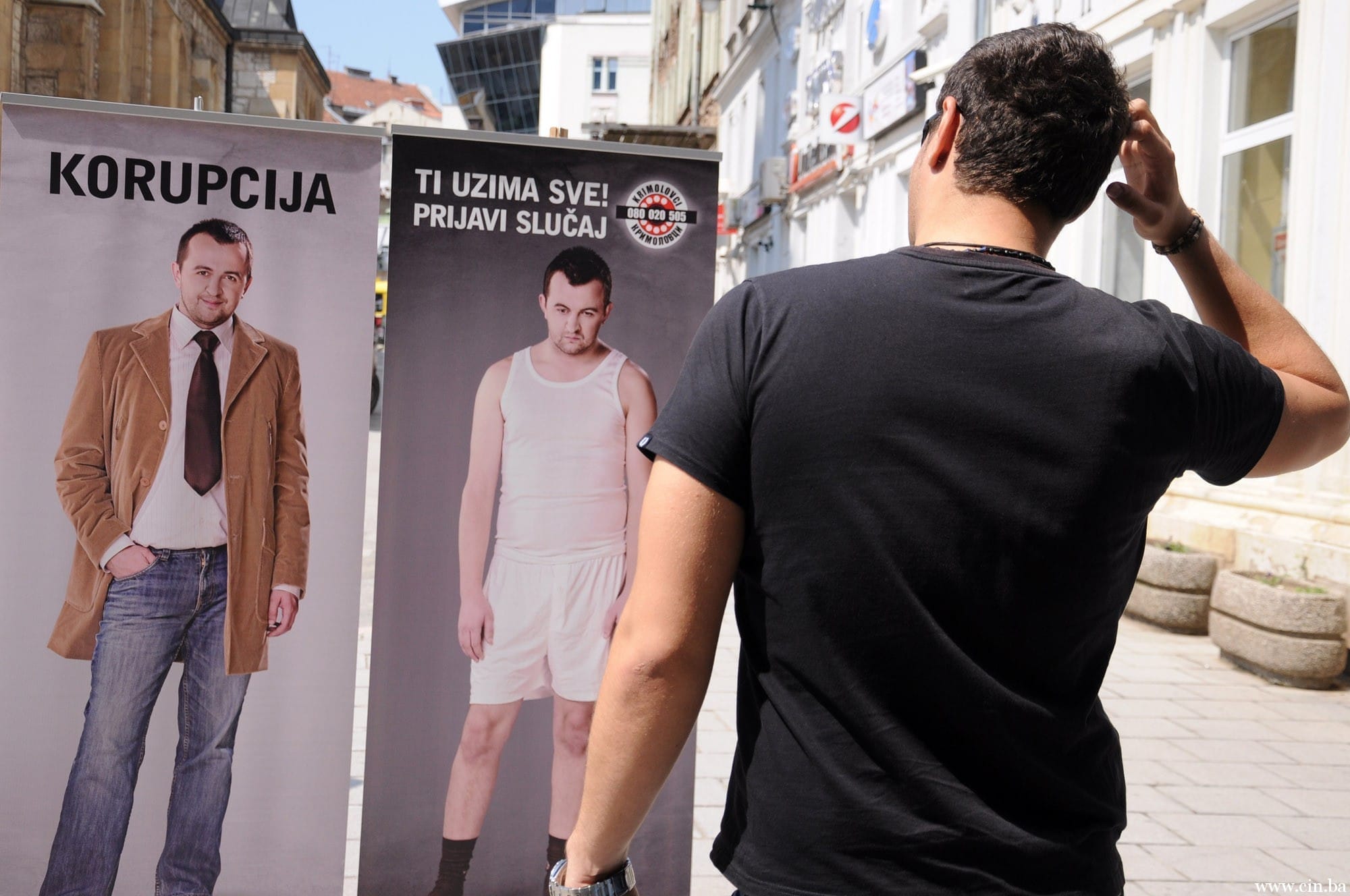One out of five persons found guilty of corruption gets a prison sentence in Bosnia and Herzegovina (BiH), even though the law prescribes time for most corruption offenses.
According to the High Judicial and Prosecutorial Council (HJPC) which monitors the judiciary and personnel, over the past five years 1,458 corruption proceedings have been conducted and one-third of the defendants have been acquitted. The courts have handed down only 211 prison terms. In other cases the sentenced persons have been either paroled or fined, the statistics show.
Indictments against leading politicians get thrown out at courts for the most part, and while some low-level officials may receive prison sentences, a number of them win pardons a few months into their terms or even before they begin.
‘Such criminal justice policy is even a motivation for new criminal offences’, said Meddžida Kreso, president of the Court of BiH. But she is not empowered, she said, to order judges to hand down harsh sentences.
Over the past five years, 25 persons have been prosecuted before the Court of BiH but only three ended up with prison sentences. Trials are pending against five persons, while the rest have been acquitted or received probation or fines.
During the same period, courts in the Federation of BiH (FBiH) have given a prison sentence to 13 percent of those charged with corruption, while Republika Srpska (RS) courts have given prison sentence to 30 percent. Corruption has been most severely punished by courts in the District of Brčko where 71 percent of those convicted ended up in prison.
Damjan Kaurinović, the president of the Appeal court in Brčko said that light verdicts are a clear indication that BiH judiciary is prosecuting only smaller cases of corruption.
The HJPC statistics show that BiH courts are prosecuting fewer cases of corruption, even though the number of reported offences is on the rise. For example, prosecutors at all levels had worked on 3,615 charges at the end of the last year, which is 900 charges more than in 2004. Meanwhile, the courts prosecuted 238 cases, that is, 136 cases less than five years earlier.
Protracted Investigations against Dodik, Lagumdžija and Hadžić
Corruption in BiH is nearing troubling levels according to the HJPC’s president Milorad Novković. In a letter from November 2010 he called upon all judges and prosecutors to fight corruption more energetically. He warned them that they will be held accountable two to four years from now if they have not produced some concrete results.
‘These criminal offences are difficult to expose and it is likely there are persons who are protected’ Novković told the Center for Investigative Reporting in Sarajevo (CIN).
CIN reporters analyzed the length of investigations against well-known and influential politicians, public officials and the directors of public companies and found that they extend far beyond the six months the law prescribes.
Back as far as March 2008, the BiH Prosecutor’s Office requested documentation about construction deals between the RS government and its agencies and companies of the Integral group owned by Slobodan and Slavica Stanković.
The State Investigation and Protection Agency (SIPA) submitted a report to the prosecutors in February 2009 in which it charged organized crime, abuse of office, money laundering and tax evasion against then RS Prime Minister Milorad Dodik, six ministers of the RS Government and six senior officials and heads of government agencies together with Stanković and his wife.
Among other things SIPA stated that the law was violated during the construction of new RS government headquarters, the RS Broadcasting Corporation in Banja Luka, and part of the Gradiška – Banja Luka highway, damaging the RS budget for 115 million KM.
In early June some aspects of the case were transferred to the RS Special Prosecutor’s Office.
A few days later the BiH Prosecutor’s Office dropped another high-level investigation. It has been two years since they started looking into Zlatko Lagumdžija and Damir Hadžić, the president and vice-president of the Social Democratic Party of BiH and Sead Hasibović, director of the Sarajevo construction firm Butmir.
In summer 2009, Nihad Imamović, then director of ASA Holding, reported them to police saying that they solicited 2.2 million KM from him to use their political influence to lift the ban that prevented ASA from putting up a business building in Sarajevo.
The case has been transferred to the Sarajevo Canton Prosecutor’s Office.
CIN recently wrote about another case transferred to the same prosecutor’s office two years earlier.
The Dragan Čović trial has gone on intermittently since October 2005. At the end of 2006 he was sentenced to five years in prison pending appeal because at the time when he was the FBiH finance minister he had helped a Široki Brijeg-based Lijanović Company evade paying 1.9 million KM in special taxes on imported meat. However, in mid-2008, the Appeal Chamber of the BiH Court ruled that it lacked jurisdiction.
The trial was not repeated because as CIN found out, the judicial institutions lost some evidence while transporting documents.
The Sarajevo Canton Prosecutor’s Office spent more than five years investigating Ibrahim Jusufranić, former director of the Sarajevo Public Transport Company (GRAS), and nine others.
In a November 2006 report of the FBiH Financial Police, GRAS management was cited for procuring four car washes for the firm’s vehicles without the approval of cantonal government. In doing so, it favored one supplier and concluded a damaging contract. This investment had cost GRAS 2.7 million KM, and other damaging contracts were also concluded for more than 3.2 million KM.
Nives Kanevčev, chief prosecutor of Sarajevo Canton, explained that prosecutors in the Department for Economic Crimes division are overburdened with some 100 cases each on their hands.
Trial of Officeholders
Statistics show that prosecutors are giving up on investigations more and more. In 2010 prosecutors have issued 58.6 percent more orders not to conduct an investigation then in 2006.
Novković said that investigations are problem, but he added that where a case made it past the investigation phase, it usually reaches the court and gets prosecuted.
In December 2007, the trial against 11 persons charged with abuse of office began before the Court of BiH. Among them where the former prime ministers of Hercegovina-Neretva Canton Josip Merdžo and Miroslav Ćorić, the former ministers of internal affairs Goran Bilić, Dragan Mandić and Tomislav Martinović, the former deputy minister Sead Šehić and the former police commissioner Srećko Glibić. The indictment charged them with damaging the Canton’s budget for nearly 7.8 million KM.
The government and police officials have been charged with contracting a Mostar-based private security firm Redarstvenik for securing HNK’s agencies, even though according to the Canton’s Law on Internal Affairs, only police may secure government buildings. Redarstvenik received more than 1.3 million KM during four years. They have also been charged with illicit giving away ministry’s vehicles to Croatian Democratic Union (HDZ), football clubs as well as private persons.
During the past three and half years, more than 80 hearings have taken place, while the date of the pronouncement of the first-instance verdict has not yet been decided.
Punishment for Corruption – a Pardon
The Court of BiH has tried 22 politicians and office holders for corruption since its inception in 2003. Fourteen have been acquitted (some pending appeal by the prosecutor’s office), Ante Jelavić is on the run, while five are waiting for the first-instance verdict.
The two convicted are former officials of the Serb Democratic Party and HDZ, Momčilo Mandić and Miroslav Rupčić respectively.
In March 2007, Mandić was sentenced to five years in prison and ordered to return 4.7 million KM. He had given out a number of unsecured loans to an SDS-owned company and to companies his family owned between 1998 and 2003 when he was first a director and later the president of the board of the former Commercial Bank of Srpsko Sarajevo.
He never paid the damages. According to Miloš Stajić, the bank’s liquidation manager, the damages case is ongoing before the Basic court in Sokolac.
Rupčić was sentenced to 5.5 years of prison in October 2004, because during his tenure as the FBiH Deputy Minister of Defense, he mismanaged the HVO money to establish Herzegovina bank and enrich shareholders and connected companies. He served two years and seven months and he was released in July 2007 after the BiH member of Presidency Nebojša Radmanović pardoned him.
CIN has published that Rupčić was one of 25 officeholders and civil servants sentenced for corruption in various courts who have been pardoned by the BiH Presidency and the FBiH and the RS presidents over the past five years.
The employees of the judiciary institutions with whom CIN reporters talked said that such practice was frustrating them because it undermined their work.
Kanevčev, the head prosecutor, said that it is difficult to prove corruption which is why these cases ‘should be more harshly punished while leniency seems to be on the rise.’
Amor Bukić, the chief RS prosecutor, said that it was frustrating how high the courts have raised the bar for proving corruption. He said that it was difficult to understand the verdict in which, for example, the court has established that the director who had damaged the public company for several tens of thousands KM by choosing a more expensive bid, was nevertheless released because the prosecutor could not prove any bad intention.
Even when prosecutors have the courage to bring indictments against important persons they have failed regularly because the courts will take nothing as a proof.
‘Let’s be realistic, in this country it is difficult to sentence anyone who is of some importance’, says Bukić.
First published on June 11, 2011







